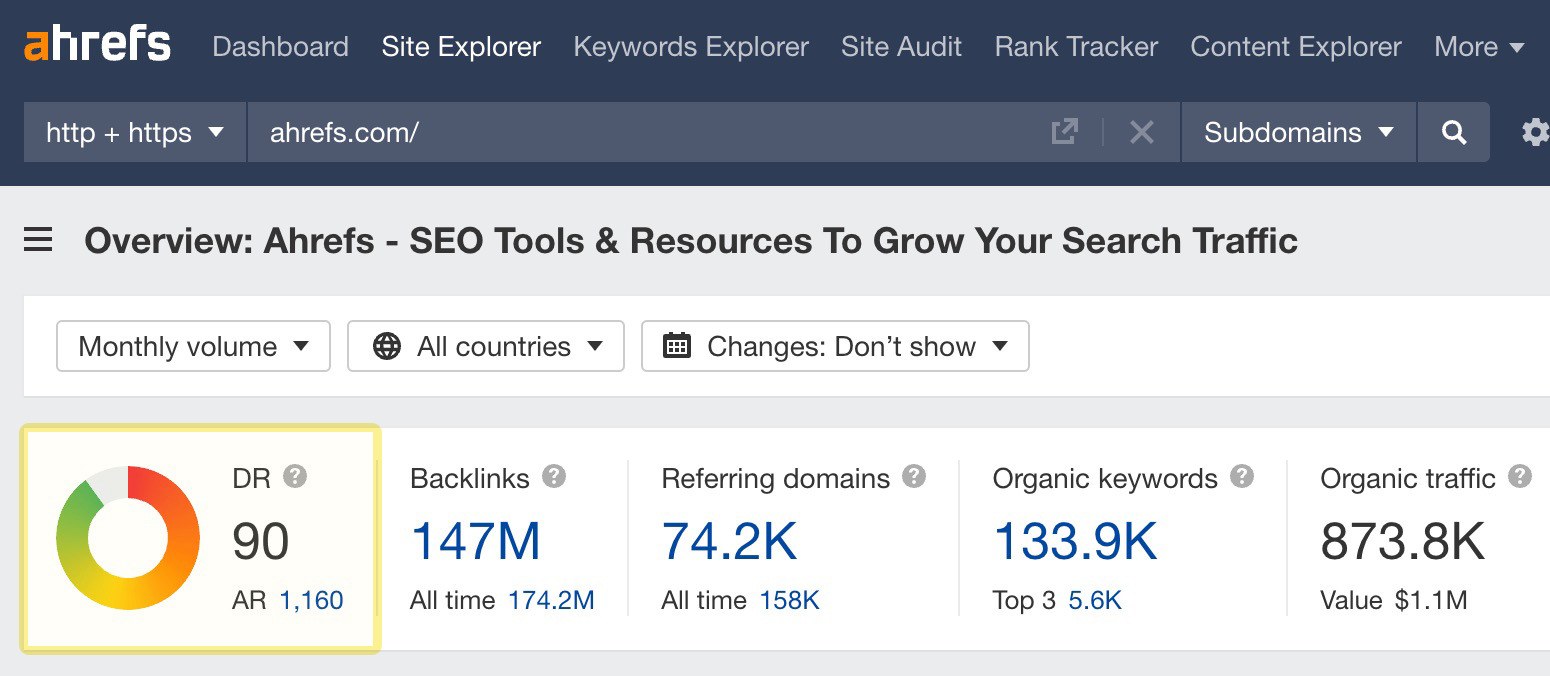If you’re an online marketer, you've likely encountered the term domain authority. It’s a critical metric used by many SEO professionals to evaluate how well content might rank in SERPs. Understanding domain authority is essential, whether you’re a seasoned expert or just starting. It helps predict your site's ranking potential and guides your SEO strategies.
This article covers everything you need to know about domain authority: what it is, how it’s calculated, what tools use it, and, most importantly, how to improve your domain authority. By the end, you’ll be equipped with practical tips to boost your site's authority and rank higher in search results.
What is Domain Authority?
Domain authority (DA) is a score developed by Moz that predicts how well a website will rank on search engine result pages (SERPs). It ranges from 0 to 100, with higher scores indicating a greater ability to rank. This metric is not used by Google but serves as a helpful indicator of your website’s SEO strength.
According to 65.4% of SEOs, domain authority is more important than the number of links on their target page in terms of search rankings. This highlights the significance of maintaining a strong domain authority score. (AuthorityHacker)
How is Domain Authority Calculated?
Domain authority is calculated using various SEO metrics, including the number and quality of backlinks, the diversity of your link profile, the quality and relevance of your content, and your site's overall structure and user experience. Social signals, such as shares and likes, also play a role in increasing visibility and attracting more backlinks.

Why Does Domain Authority Matter?
Domain authority is vital for several reasons:
- Competitive Analysis: It helps compare your site’s strength with competitors, giving you a benchmark to strive for.
- SEO Strategy: A higher DA often correlates with higher rankings and more organic traffic, guiding your content strategy.
- Partnerships and Sponsorships: Companies may look at your DA to decide on collaborations or sponsorships, making it a valuable metric for business opportunities.
- Predictive SEO: DA helps predict your ranking potential for specific keywords, guiding your efforts to target high-value search terms.
What is a Good Domain Authority Score?
A 'good' domain authority score is relative and depends on your industry and competitors. Generally, a score between 40-50 is considered average, 50-60 is good, and above 60 is excellent. However, the goal is to continually improve your DA relative to your competitors.
How is Domain Authority Calculated?
Domain authority is calculated using several factors:
- Backlinks: The number and quality of backlinks pointing to your website. According to a 2024 study by Ahrefs, 90% of websites don’t get any organic traffic because they don’t have any backlinks.
- Link Profile: A diverse and natural link profile.
- Content Quality: Regularly updated, high-quality content that is relevant and engaging.
- Site Structure and User Experience: Easy navigation and a positive user experience.
- Social Signals: Social shares and likes that increase visibility and attract more backlinks.

How to Improve Your Domain Authority
Create Killer Content
Creating killer content is crucial for improving your domain authority. Longer articles tend to get more traffic, social shares, and backlinks. They rank higher on Google, too, because they are more thorough and provide more valuable information. For WordPress users, utilizing SEO plugins like All in One SEO can help optimize your content and improve internal linking, which is essential for enhancing your site’s authority.
Use Guest Post Campaigns
Guest blogging is a powerful strategy to boost your domain authority. By writing and submitting guest posts on high-authority sites within your niche, you can gain valuable backlinks and wider exposure for your business. Ahrefs can help you find relevant authority sites to pitch your guest posts. Additionally, ensure that your web hosting provider supports the speed and performance necessary to handle the increased traffic from these backlinks.
Usability
When it comes to ranking, Google values usability. Your content won't rank in the search results without a great user experience. Additionally, optimizing title tags for SEO is crucial, as they provide a clear indication to search engines about the content of your pages. Make sure your website theme is mobile-responsive and visually appealing. Plugins like NitroPack can help optimize site speed, ensuring a smooth and fast experience for visitors.
Competitor Analysis
To stay ahead in your niche, you must monitor your competitors. Analyzing their content, keywords, and backlinks can provide insights into what works well in your industry. For example, if a competitor with a high domain authority is consistently publishing content on a specific topic, consider creating high-quality, unique content on the same topic to attract similar backlinks.
PR Link Building Campaigns
Want to increase the domain authority of your WordPress site? Try running a PR campaign focused on link building for SEO. It can be difficult, but the results can be impressive.
Running a PR link-building campaign can significantly increase your domain authority. It involves reaching out to media outlets and influencers to secure backlinks to your site. Ensure that your web hosting can handle the potential influx of visitors from these high-authority links without compromising site speed.
Plugins to Facilitate Social Engagement
Adding plugins to increase social engagement can drive more traffic to your site, which can help improve your domain authority. NovaShare can make it easy for visitors to share your content across social media platforms, increasing its reach and impact.

How to Find Your Website's Domain Authority
There are many tools to check your website’s domain authority:
- SEMrush: A comprehensive SEO tool that provides a DA score and other insights.
- Moz: The creator of the DA metric, offering detailed analysis and recommendations.
- Ahrefs: Uses a similar metric called Domain Rating (DR), which also considers the number of referring domains.
Tools Which Use Domain Authority
Various tools and platforms use domain authority, including:
- Moz: The developer of the DA metric.
- Majestic: Provides a range of SEO metrics.
- SEMrush: Offers DA along with other SEO insights.
- Ahrefs: Uses Domain Rating (DR), similar to DA but with key differences.
Ahrefs Domain Rating
Domain Rating (DR) by Ahrefs is similar to domain authority but focuses on the number of referring domains. DR ranks a site from 0-100, providing a different perspective on a site's strength. Unlike DA, DR also considers the quality of referring domains, offering a more nuanced view of your site's authority.
According to 42.6% of link builders, Domain Rating (DR) and domain authority (DA) are crucial indicators of link building success in their projects. This underscores the importance of understanding both metrics when evaluating your site’s performance. (AuthorityHacker).

Conclusion
Improving your domain authority is essential for better search engine rankings. By focusing on creating high-quality content, engaging in guest post campaigns, enhancing usability, conducting competitor analysis, running PR link-building campaigns, and using social engagement plugins, you can significantly boost your site’s authority. Ensure that your web hosting provider supports these efforts by offering reliable performance and speed. Remember, while domain authority is important, focusing on a holistic SEO strategy will yield the best results.
In simple terms, what is domain authority?
DA, which stands for Domain authority, is used to measure the ranking of a website on SERPs. There is a scale of from 0 to 100, and higher scores indicate greater ability for ranking.
How do you calculate domain authority?
The domain authority score is calculated using a range of SEO metrics, which include the quantity and quality of backlinks, the variety of your link profile, the quality and relevance of your content, and your site's overall structure and user experience. Social signals, such as likes and shares, are also relevant.
Why is domain authority relevant?
Domain authority is crucial in comparing your site's capabilities with those of competitors, devising SEO strategies, forecasting keyword rankings, and influencing business opportunities such as partnerships and sponsorships.
How does one determine a good domain authority score?
A score of 40-50 is typically considered average, a score of 50-60 as good, and a score of above 60 is considered excellent.
How do I improve domain authority?
Enhancing your domain authority involves crafting content of high quality, conducting guest posting campaigns, improving website usability through competitor analysis and PR link-building campaigns, and using social media plugins to facilitate social interaction.
How can I check my domain authority?
Tools such as SEMrush, Moz and Ahrefs help you check your domain authority. These platforms offer comprehensive analysis and advice to boost your site's visibility.
What function do backlinks have in domain authority?
Backlinks are essential for domain authority. They are an important factor in DA calculation because they help determine the credibility and popularity of your site. According to a study by Ahrefs in 2024, 90% of websites do not receive organic traffic because they lack backlinks.

Nadejda Milanova
An experienced Content creator in the field of Search Engine Optimization (SEO) and WordPress. A true proffesional with a Master's degree focused on journalism.
Read more by Nadejda Milanova





